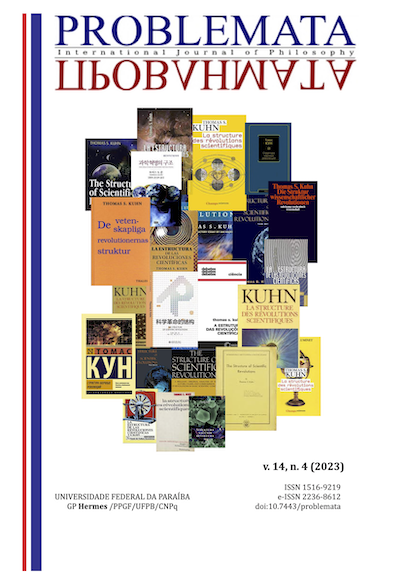RACIONALIDADE E RELATIVISMO NA ESTRUTURA?
DOI:
https://doi.org/10.7443/problemata.v14i4.66827Palavras-chave:
Racionalidade científica, Relativismo epistemológico, Incomensurabilidade, Thomas Kuhn, Gerald DoppelResumo
Neste artigo, examino a interpretação relativista de Gerald Doppelt acerca da concepção de racionalidade científica em The structure of scientific revolutions de Thomas Kuhn. Procuro mostrar que o relativismo de Doppelt implica que os juízos de superioridade cognitiva em uma disputa por paradigma são relativos a visões de ciência. Defendo que essa leitura inviabiliza uma explicação para o fato de que cientistas mudam de diretrizes de pesquisa com base em boas razões. Em seguida, argumento que ela não captura fases do período revolucionário. Por fim, à luz de certos aspectos da controvérsia flogisto-oxigênio, argumento que o equívoco de Doppelt foi identificar a incomensurabilidade epistemológica presente no debate entre cientistas rivais em período de ciência extraordinária com a incomensurabilidade epistemológica entre paradigmas que orientaram a comunidade científica em períodos sucessivos de ciência normal. Como alternativa, indico que os pronunciamentos de Kuhn podem ser interpretados de uma perspectiva pragmatista, a partir do qual cientistas não são prisioneiros de seus compromissos de pesquisa e situações relativistas em controvérsias científicas são transitórias.
Downloads
Referências
BARNES, Barry. Kuhn and social science. New York: Columbia University Press, 1982.
BEST, Nicholas W. Lavoisier’s “Reflections on phlogiston” I: against phlogiston theory. Foundations of Chemistry, v. 17, p. 137–151, 2015. DOI: https://doi.org/10.1007/s10698-015-9220-5
BIRD, Alexander. Thomas Kuhn’s relativistic legacy. In: HALES, Steven D. A companion to relativism. Oxford: Blackwell Publishing, 2011, p. 475-488.
BLUMENTHAL, Geoffrey; LADYMAN, James. The development of problems within the phlogiston theories, 1766-1791. Foundations of Chemistry, v. 19, p. 241-280, 2017. DOI: https://doi.org/10.1007/s10698-017-9289-0
DAUMAS, Maurice; DUVEEN, Denis. Lavoisier's relatively unknown large-scale decomposition and synthesis of water, february 27 and 28, 1785. Chymia, v. 5, p. 113-129, 1959.
DOPPELT, Gerald. Kuhn’s epistemological relativism: an interpretation and defense. Inquiry, v. 21, p. 33-86, 1978.
GUITARRARI, Robinson; PLASTINO, Caetano Ernesto. Dimensões da incomensurabilidade. Ideação, v. 1, p. 31-62, 2014.
GUITARRARI, Robinson. O relativismo é autorrefutante? Transformação, v. 39, p. 139-158, 2016.
HEMPEL, Carl Gustav. Studies in the Logic of Confirmation. Mind, v. 54, p. 1-26, p. 97–121, 1945.
HOYNINGEN-HUENE, Paul. Reconstructing scientific revolutions: Thomas Kuhn’s Philosophy of Science. Chicago: The University Chicago Press, 1993.
KITCHER, Philip. The advancement of science: science without legend, objectivity without illusions. Oxford: Clarendon Press, 1993.
KITCHER, Philip. Patterns of scientific controversies. In: MACHAMER, P.; PERA, M.; BALTAS, A. (ed.). Scientific controversies: philosophical and historical perspectives. New York: Oxford University Press, 2000. p. 21-39.
KITCHER, Philip. Science, truth, and democracy. New York: Oxford University Press, 2001.
KITCHER, Philip. The many lessons of Structure. Historical Studies in the Natural Sciences, v. 42, n. 5, p. 532-537, 2012.
KUHN, Thomas Samuel. The structure of scientific revolutions. 2. ed. Chicago: Chicago University Press, 1970.
KUHN, Thomas Samuel Objectivity, value judgment, and theory choice. In: KUHN, Thomas S. The essential tension. Chicago: University of Chicago Press, 1977. p. 320-339.
KUHN, Thomas Samuel. Commensurability, comparability, communicability. In: KUHN, Thomas S. The road since Structure. Chicago/London: University of Chicago Press, 2000. p. 32-57.
LAKATOS, Imre. Falsification and the methodology of scientific research programmes. In: LAKATOS, Imre; MUSGRAVE, Alan (ed.). Criticism and the growth of knowledge: Proceedings of the International Colloquium in the Philosophy of Science, London, 1965. Cambridge: Cambridge University Press, 1970. p. 91-196.
LAUDAN, Larry. Science and values. Berkeley, Los Angeles, London: University of California Press, 1984.
LAUDAN, Larry. For method: answering the relativist critique of methodology of Kuhn and Feyerabend. In: LAUDAN, Larry. Beyond positivism and relativism: theory, method, and evidence. Colorado: Westview Press, 1996. p. 88-112.
LAUDAN, Larry; LAUDAN, Rachel. Dominance and the disunity of method: solving the problems of innovation and consensus. Philosophy of Science, v. 56, p. 221-237, 1989.
POPPER, Karl Raimund. The logic of scientific discovery. London: Hutchinson, 1959.
POPPER, Karl Raimund. Normal science and its dangers. In: LAKATOS, Imre; MUSGRAVE, Alan. (ed.). Criticism and the growth of knowledge: Proceedings of the International Colloquium in the Philosophy of Science, London, 1965. Cambridge: Cambridge University Press, 1970. p. 51-58.
PUTNAM, Hilary. Reason, truth, and history. Cambridge: Cambridge University Press, 1981.
SCHEFFLER, Israel. Science and Subjectivity. Indianapolis: Bobbs-Merrill, 1967.
SHAPERE, Dudley. Meaning and Scientific Change. In: COLODNY, Robert G. (ed.). Mind and Cosmos: Essays in Contemporary Science and Philosophy. Pittsburgh: University of Pittsburgh Press, 1966. p. 41-85.
Downloads
Publicado
Edição
Seção
Licença
Copyright (c) 2023 Robinson Guitarrari

Este trabalho está licenciado sob uma licença Creative Commons Attribution 4.0 International License.
Autores que publicam nesta revista concordam com os seguintes termos:
- Autores mantém os direitos autorais e concedem à revista o direito de primeira publicação, com o trabalho simultaneamente licenciado sob a Licença Creative Commons Attribution que permite o compartilhamento do trabalho com reconhecimento da autoria e publicação inicial nesta revista.
- Autores têm autorização para assumir contratos adicionais separadamente, para distribuição não-exclusiva da versão do trabalho publicada nesta revista (ex.: publicar em repositório institucional ou como capítulo de livro), com reconhecimento de autoria e publicação inicial nesta revista.
- Autores têm permissão e são estimulados a publicar e distribuir seu trabalho online (ex.: em repositórios institucionais ou na sua página pessoal) a qualquer ponto antes ou durante o processo editorial, já que isso pode gerar alterações produtivas, bem como aumentar o impacto e a citação do trabalho publicado (Veja O Efeito do Acesso Livre).







